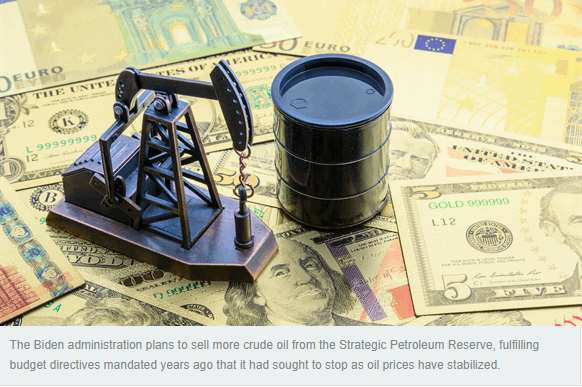
The Biden administration plans to sell more crude oil from the Strategic Petroleum Reserve, fulfilling budget directives mandated years ago that it had sought to stop as oil prices have stabilized.
The congressionally mandated sale will amount to 26 million barrels of crude, according to people familiar with the matter. The sale is in accordance with a budget mandate enacted in 2015 for the current fiscal year, said a spokesperson for the Department of Energy.
The Energy Department has sought to stop some of the sales required by 2015 legislation so that it can refill the emergency reserve, which currently has about 371 million barrels. After this latest release, the reserve will dip to about 345 million.
Biden officials decided last year to tap 180 million barrels from the strategic reserve in an effort to ease supply issues after Russia invaded Ukraine, upending global oil flows and sending crude above $100 a barrel. Some Republicans have criticized the Biden administration for that drawdown, which was the biggest release ever and helped drain the SPR to its lowest level since 1983. Critics admonished the move as a political stunt intended to combat rising gasoline prices ahead of midterm elections.
Biden officials have since spoken with energy companies about purchasing oil to refill the SPR when prices approach $70 a barrel.
The latest release comes after Russia unveiled plans to curtail production by half-a-million barrels a day next month to retaliate against sanctions. Russia’s move, which was downplayed by the European Union, follows China’s rapid economic reopening with the scrapping of Covid-19 restrictions. The SPR release may give pause to the OPEC+ alliance, which earlier said that global oil markets remain balanced.
Market reaction
The US House last month passed legislation meant to curb the Energy secretary’s ability to use the reserve unless the government increases the amount of federal lands available for gas and oil drilling.
Other congressionally required releases — about 140 million barrels slated for fiscal years 2024 through 2027 — were canceled at the Energy Department’s behest after lawmakers in December approved a provision in a giant spending bill.
West Texas Intermediate, the US benchmark for crude, fell 1% to trade near $79 a barrel after the announcement of more barrels.
The Biden administration plans to sell more crude oil from the Strategic Petroleum Reserve, fulfilling budget directives mandated years ago that it had sought to stop as oil prices have stabilized.
The congressionally mandated sale will amount to 26 million barrels of crude, according to people familiar with the matter. The sale is in accordance with a budget mandate enacted in 2015 for the current fiscal year, said a spokesperson for the Department of Energy.
The Energy Department has sought to stop some of the sales required by 2015 legislation so that it can refill the emergency reserve, which currently has about 371 million barrels. After this latest release, the reserve will dip to about 345 million.
Biden officials decided last year to tap 180 million barrels from the strategic reserve in an effort to ease supply issues after Russia invaded Ukraine, upending global oil flows and sending crude above $100 a barrel. Some Republicans have criticized the Biden administration for that drawdown, which was the biggest release ever and helped drain the SPR to its lowest level since 1983. Critics admonished the move as a political stunt intended to combat rising gasoline prices ahead of midterm elections.
Biden officials have since spoken with energy companies about purchasing oil to refill the SPR when prices approach $70 a barrel.
The latest release comes after Russia unveiled plans to curtail production by half-a-million barrels a day next month to retaliate against sanctions. Russia’s move, which was downplayed by the European Union, follows China’s rapid economic reopening with the scrapping of Covid-19 restrictions. The SPR release may give pause to the OPEC+ alliance, which earlier said that global oil markets remain balanced.
The US House last month passed legislation meant to curb the Energy secretary’s ability to use the reserve unless the government increases the amount of federal lands available for gas and oil drilling.
Other congressionally required releases - about 140 million barrels slated for fiscal years 2024 through 2027 - were canceled at the Energy Department’s behest after lawmakers in December approved a provision in a giant spending bill.
West Texas Intermediate, the US benchmark for crude, fell 1% to trade near $79 a barrel after the announcement of more barrels.